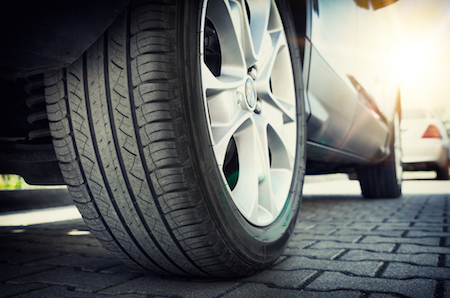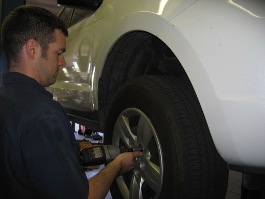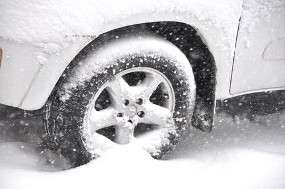“My car shakes when I drive it.”
“My car veers off if I don’t hold tight to the steering wheel.”
Have you ever thought something similar when you drive your car? Maybe your car is in need of a tire balance or alignment.
Tire balancing and alignment are two phrases you might be familiar with. Drivers use them all the time. But what do they really mean? Are they the same thing? Can you use “tire balance” and “alignment” interchangeably for when you notice something wrong with the way your car drives?
What is tire balancing?
Tire balancing is also sometimes referred to as wheel balancing. Tire balancing corrects the distribution of weight onto each of the four wheels.
When a wheel is imbalanced, it leads to vibration while driving> If you’ve ever felt your vehicle shimmy and shake, it may be from imbalanced wheels. It can also cause excessive wear on the tires. If the tires don’t hit the pavement in the same manner on all four sides, it can cause some tires to wear faster than others. It can also damage the suspension system. The wheels are designed to keep your car stable as it moves. If it’s off balance, it can’t protect critical components of your car.
When a mechanic performs a tire balance on your vehicle, they apply zinc, lead, or composite weights to each wheel rim, both inside and outside. Because wheels are designed in different ways, there are several different types of weight application, determined by what your vehicle needs.
The weights are either pounded or taped into place to check balancing. Legislation has been enacted in some states to ban the use of lead weights, as many of them would fall off and wind up underground, potentially impacting our water supply.
What are the signs your car needs tire balancing?
 If you start to notice a vibration as you are driving, it’s a sign your tires need balancing. You might notice a shake in your steering column, feel it underneath your feet on the floorboard, or even notice movement in your seat.
If you start to notice a vibration as you are driving, it’s a sign your tires need balancing. You might notice a shake in your steering column, feel it underneath your feet on the floorboard, or even notice movement in your seat.
Pay attention to the vibration as it can signal where your tires are out of balance. A tremble in your steering wheel can mean your front tires are impacted. If you notice your seat vibrating, it’s a sign it’s the back wheels.
You should also periodically inspect your tires. Do you notice uneven wear marks? Are certain parts of the tire wearing smooth before the rest? Does one tire look more heavily worn than others? All can be a signal your tires are imbalanced.
Also pay attention to your drive. Do you drive dirt roads frequently? Do you ignore potholes because you hit them often? Have you hit the curb recently? All of these things and more can damage your tires and wheels, and cause your tires to go out of balance.
What is wheel alignment?
Wheel alignment is also known as tire alignment. It refers to the practice of adjusting your car’s suspension system for a smoother ride. This isn’t an adjustment of the tires or wheels themselves, rather, the work is done to the suspension system to control the smoothness of the ride.
Alignment is what is needed to keep your car from veering off to the right or left when you drive. It can also improve the overall handling of your vehicle, and avoid certain vibrations that develop over time.
What are the signs your car needs a wheel alignment?
You might need a wheel alignment if you notice any of the following things:
- Your car starts pulling to one side or the other while you drive
- You notice uneven tire tread, or your tires are prematurely wearing down
- You notice a squealing noise coming from your tires
- You notice problems with your steering wheel, such as it tilts off-center, or vibrates when you accelerate
If you’ve been in a car accident, or you’ve recently slid into a curb, your vehicle is most likely in need of a wheel alignment.
Do I need a tire balance or wheel alignment?
Both tire balancing and wheel alignment should be a part of your regular maintenance routine. Just realize that the two are separate maintenance items, each being required to keep your car in good working condition as it ages.
While balancing is ensuring each individual tire is connecting well with the road, alignment is about modifying the angles of the wheels to ensure they are in proper position to each other, and to ensure the tires connect well with the road. An alignment ensures all four wheels are traveling in the same direction, and makes sure each tire stays well connected to the ground.
When do you balance your tires?
While it’s important to have your tires balanced if you feel a problem as you drive, there are also other times when you should rebalance your tires.
- At a bare minimum, once every two years, more if you drive rough roads
- When you get them rotated, which should occur about every 5,000 miles
- When you have a flat and fix your tire
- When you buy new tires
- If you notice a weight missing from one of the rims
- When you notice uneven wear on a tire
When do you align your wheels?
It’s suggested that you get your wheels aligned every time you have new tires put on your vehicle. You should also get an alignment:
- If you have an accident
- If you hit something, such as a curb, with your wheels
- If you have severe wear on your tires
- If you feel your car pulling as you accelerate
- If you replace your tires
Keep in mind that not all vehicles need the same wheel alignment. A four-wheel drive doesn’t require a four-wheel alignment. Any vehicle with a single-tube axle can only have a front-end alignment.
And if your vehicle has other front end damage that may impact the alignment, it might be better off to wait until all work is completed. This way you won’t have to get an alignment twice.
Have more questions? We’re here to help. Just ask.

 It can also be deadly.
It can also be deadly. You can make the tires on your vehicle last longer with a regular tire rotation and balancing.
You can make the tires on your vehicle last longer with a regular tire rotation and balancing. Question: I need new tires, but how do I know which tires to select?
Question: I need new tires, but how do I know which tires to select? Express Car Care Question: My name is Dan. The tires on my vehicle wore out early and I had to replace them. What can I do to make my tires last longer?
Express Car Care Question: My name is Dan. The tires on my vehicle wore out early and I had to replace them. What can I do to make my tires last longer? Question: How do I know when I should get my tires rotated and balanced?
Question: How do I know when I should get my tires rotated and balanced? Question: What is the benefit of winter tires?
Question: What is the benefit of winter tires? All new cars and light trucks in Denver since 2008 have come equipped with a tire pressure monitoring system, or TPMS. The tire pressure monitoring system detects when a tire becomes under-inflated and lights up a warning light on the dashboard.
All new cars and light trucks in Denver since 2008 have come equipped with a tire pressure monitoring system, or TPMS. The tire pressure monitoring system detects when a tire becomes under-inflated and lights up a warning light on the dashboard. For most people buying tires can be a big deal, so play it safe and consult with your friendly and knowledgeable tire professional about the proper size, type and grade for your driving needs. He can help you balance load requirements, performance, durability and cost.
For most people buying tires can be a big deal, so play it safe and consult with your friendly and knowledgeable tire professional about the proper size, type and grade for your driving needs. He can help you balance load requirements, performance, durability and cost. Tire rotation is an important maintenance duty that extends the life of your tires and ensures safe driving. Let’s take a look at this simple and effective procedure.
Tire rotation is an important maintenance duty that extends the life of your tires and ensures safe driving. Let’s take a look at this simple and effective procedure.